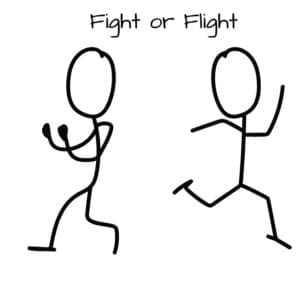Topic 4 – Fight or Flight

 The ‘fight or flight’ stress response is an evolutionary reaction, which occurs in our body in times of perceived danger. Just like animals in the wild, when human beings feel threatened in some way, certain stress hormones such as adrenaline and cortisol are released which speed up our heart-rate, slow down our digestion, and move our blood to our major muscle groups. This state is called ‘hyperarousal’ and these physical responses are meant to help us to become more alert and energised, and ready to take action against our perceived threat in order to improve our chances of survival.
The ‘fight or flight’ stress response is an evolutionary reaction, which occurs in our body in times of perceived danger. Just like animals in the wild, when human beings feel threatened in some way, certain stress hormones such as adrenaline and cortisol are released which speed up our heart-rate, slow down our digestion, and move our blood to our major muscle groups. This state is called ‘hyperarousal’ and these physical responses are meant to help us to become more alert and energised, and ready to take action against our perceived threat in order to improve our chances of survival.
So why is this response called ‘fight or flight’ and how is it relevant to anger?
Originally when humans were hunters and gatherers and faced with physical threats to our lives (such as coming face-to-face with a tiger which could kill you), we had two options: to stay and fight, or to withdraw and flee (flight). Nowadays, this same chemical response is activated in situations when we feel fear or anxiety. The stress responses includes Freeze and in many instances in more modern times Appease, where you do whatever you are told just to manage the threat.
Unlike our ancestors, our anxieties and fears are not warning us about a physical threat to our lives. Most of the time, the threat we feel is emotional – it is worry, fear, frustration, or anxiety – so even though we experience the same chemical rush that brings on a hyper-aroused state, we no longer need to fight off our aggressor. We now have choices; we can stay and try to resolve the situation, or we can leave the situation. It is our choice whether our actions are aggressive or not.
When something scares us, whether real or imagined, and our body becomes aroused, it can take between 20 to 60 minutes for our hormone levels to return to normal when the threat is gone. However, for many people threat, stress and pressure can feel like it is ongoing, following them all day and all night. If this happens then our bodies rarely get a chance to recover and reset from all the stress hormones that are being pumped into it.
Watch this video below for an explanation of the Fight/Flight/Freeze stress produced by www.ed.ted.com